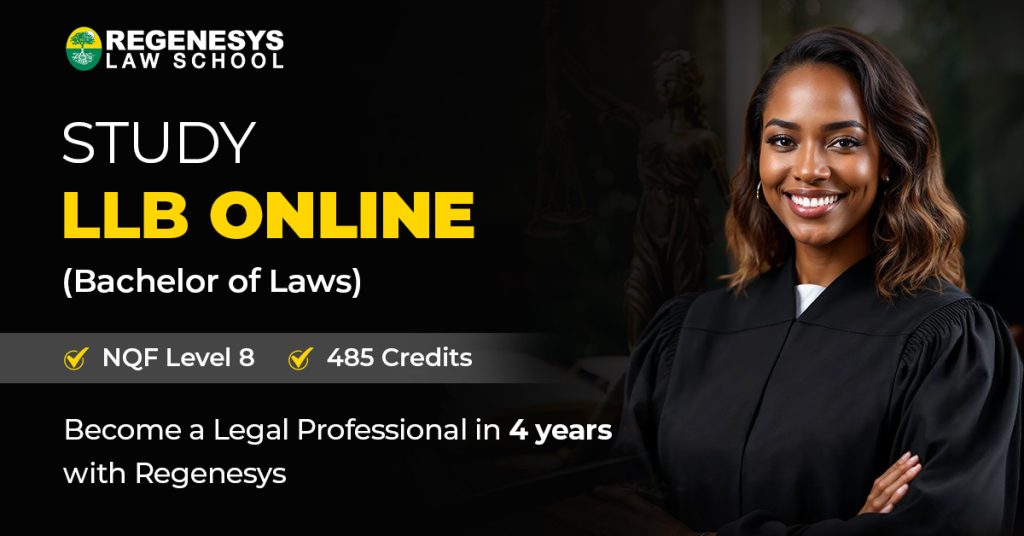Becoming a lawyer in South Africa requires more than just ambition; it begins with the right subject choices in school and continues through a structured study path. Many learners wonder what subjects are needed to become a lawyer, whether in Grade 10, Grade 12, or at university. Subject selection plays a critical role in meeting law school requirements, building strong analytical skills, and preparing for the competitive legal profession.
In this article, we explore the subjects needed to become a lawyer in South Africa, including core and optional choices, skills beyond academics, myths about subject requirements, and how institutions like Regenesys Law School support aspiring lawyers.
Table of Contents
- Overview of the Law Career Path in SA
- Importance of Subject Choices in Grade 10 & Grade 12
- Core Subjects for LLB Admission
- Elective Modules That Help in Law Studies
- Essential Skills Beyond Academic Subjects
- Career Options to Pursue After Law
- How Regenesys Supports Law Aspirants?
- Conclusion
- Subjects Needed to Become a Lawyer in South Africa – FAQ
Overview of the Law Career Path in SA
Law is one of the most respected and versatile careers in South Africa. A legal qualification not only opens doors to traditional roles such as advocate or attorney but also enables careers in corporate governance, politics, human rights, and academia.
The following points highlight the stages of a lawyer’s career path in South Africa:
- Bachelor of Laws (LLB): The essential four-year undergraduate degree providing foundational legal knowledge, critical thinking, and research skills.
- Articles of Clerkship / Practical Training: Two years of hands-on training under a qualified attorney, gaining courtroom experience and practical legal skills.
- Board Examinations: Exams administered by the Legal Practice Council to assess competency in ethics, advocacy, and legal drafting, required for admission as a lawyer.
- Specialisation: Focus on areas like criminal, family, corporate, labour, environmental, or human rights law to develop expertise and enhance career prospects.
This structured journey ensures graduates develop the expertise, ethics, and professionalism expected of the legal profession.

Importance of Subject Choices in Grade 10 & Grade 12
Choosing the Grade 10 and Grade 12 Law subjects is a key step for anyone planning to study law. These years are important because your subject choices and performance directly influence your APS (Admission Point Score), which determines your eligibility for university admission. For the Regenesys Bachelor of Laws (LLB) programme, for instance, international students are required to achieve a minimum of 26 APS with a higher-level pass.
Here are the key reasons these early choices matter when deciding on the subjects needed to study law.
- They shape your academic profile, which universities use to assess your suitability for law programmes.
- Strong performance builds your APS score, a critical metric for university applications.
- Subjects such as English and History sharpen reasoning and communication, which are essential in legal studies.
- Some universities may require a minimum pass or a specific subject mix to qualify for admission into law degrees.
To prepare for a law career, learners should focus on the subjects needed to become a lawyer that develop reasoning, communication, and ethical awareness. English enhances persuasive writing and argumentation skills, while History builds critical thinking and a deeper understanding of society. Mathematics or Mathematical Literacy strengthens logical reasoning and problem-solving abilities, and Life Orientation promotes ethical awareness and personal responsibility. By Grade 12, including subjects such as Business Studies or Economics can further demonstrate readiness for commercial and corporate law studies.
While these subject choices don’t guarantee admission, they create a strong academic platform that aligns well with law school requirements in South Africa.
Core Subjects for LLB Admission
The core requirements to study a law degree programme are the cornerstone qualification for aspiring lawyers in South Africa, providing the essential academic foundation for a legal career. To be admitted into an LLB programme, universities generally expect learners to have completed the subjects needed to study law and passed them at the matric level. To qualify for the Regenesys LLB programme, applicants must meet specific academic and competency criteria. These ensure that learners are well-prepared for the demands of legal studies.
The following are the core subjects needed to become a lawyer in South Africa:
- English proficiency: A minimum of 50% in English First Language or 60% in English Second Language. Strong language skills are essential for legal writing, research, and courtroom communication.
- Competency in Mathematics, English, and communication (both written and oral) at NQF Level 4 is expected, as these skills support analytical thinking and legal reasoning.
- Basic computer literacy: Applicants should be comfortable with using technology, have reliable internet access, and possess the necessary IT resources for online learning and research.
These requirements to study law ensure that students entering the LLB programme have both the academic foundation and practical skills needed to succeed in law school and professional practice.
Read the Top Strategies for Successfully Balancing LLB and a Job in South Africa
Elective Modules That Help in Law Studies
While the core curriculum of an LLB is structured and mandatory, students also have the opportunity to select elective modules. These electives allow law students to explore specialised areas of law that align with their career interests. Choosing the right elective modules can give you an advantage in specific legal fields, enhance employability, and build a strong foundation.
Here are some common elective modules in South Africa which can benefit your career:
Environmental Law
Focuses on the protection of natural resources and sustainability through legal frameworks. Students gain insights into climate change policies, conservation, and corporate accountability.
Insurance Law
Covers the principles of insurance contracts, claims, and dispute resolution. It equips students to understand compliance and risk management in the financial services sector.
International Business Law
Explores global trade rules, cross-border contracts, and dispute resolution in international commerce. This module is essential for students interested in global business.
Medical Law
Examines healthcare regulations, patient rights, and medical ethics. It helps future lawyers navigate issues like malpractice and liability in the health sector.
Business Management
This subject teaches how organisations work, covering leadership, planning, and strategy. It helps law students understand the business world and how companies make decisions. This knowledge is useful for careers in corporate or commercial law.
Economics
Economics focuses on markets, trade, and the way governments make financial policies. It helps law students see the bigger picture of how laws affect economies and societies. This is especially helpful in areas like trade law, competition law, and public policy.
Financial Accounting
This subject deals with reading and analysing financial statements and records. It gives law students the skills to understand money matters in companies and organisations. It is very useful for careers in tax law, corporate law, or governance.
Cyber Law
This subject deals with the legal issues around the internet, technology, and digital platforms. It covers areas like data protection, online fraud, and cybercrime. For law students, it is increasingly important as businesses and individuals rely heavily on digital systems.
These are some important fields or requirements to study Law elective modules in South Africa’s LLB programme.

Essential Skills Beyond Academic Subjects
Academic subjects for law are important, but becoming a lawyer requires broader skills that extend beyond school. Employers and law schools look for competencies that make learners effective legal professionals. Strong communication, problem-solving, research ability, and ethical judgment are essential for navigating complex legal cases.
Here are the skills every future lawyer should develop:
- Critical Thinking: Essential for analysing cases and legal precedents.
- Communication: Both written and verbal skills are vital in law practice.
- Research Ability: Lawyers must interpret statutes, case law, and regulations.
- Negotiation: Helps in dispute resolution and client management.
- Time Management: Balancing multiple cases and deadlines is part of daily legal work.
These skills, combined with the right career paths in law, prepare students not only to succeed academically but also to thrive in practice.
Read What is Medical Law? Understanding the Legal Framework of Healthcare in South Africa
Career Options to Pursue After Law
Pursuing an LLB in South Africa offers far more than just the traditional path of becoming a lawyer. The degree equips graduates with a strong legal foundation that can be applied across multiple fields, from the courtroom to government, academia, business, and even media.
Here are the career pathways post-LLB:
Assistant Prosecution Officer
An Assistant Prosecution Officer supports senior prosecutors in preparing and presenting criminal cases in court. They handle research, evidence review, and case documentation, gaining valuable courtroom experience.
Government Services
Law graduates in government services contribute to policy-making, legal compliance, and public administration. They play a key role in drafting legislation, handling disputes, and ensuring that state departments operate within the law.
Judicial Services
Those who qualify for judicial services can work towards becoming magistrates or judges. This path involves interpreting laws, presiding over cases, and ensuring fair justice delivery in society.
Law Professor or Teacher
With further academic qualifications, law graduates can teach at universities or colleges. This career focuses on educating future lawyers, conducting research, and contributing to the academic development of legal studies.
Legal Adviser
Legal advisers provide expert guidance to businesses, organisations, or individuals on contracts, compliance, and dispute resolution. They help clients navigate complex legal issues and reduce risks.
Legal Assistant
A legal assistant works closely with lawyers to prepare case files, draft documents, and conduct research. This role is ideal for gaining practical exposure to legal practice while supporting daily office tasks.
Legal Journalist
Legal journalists write about laws, court rulings, and justice-related issues for newspapers, online platforms, or broadcast media. They translate complex legal matters into accessible information for the public.
Legal Researcher
Legal researchers specialise in analysing laws, regulations, and case precedents to support lawyers, judges, or academic projects. Their work is crucial for building strong legal arguments and policies.
Litigation
Litigation involves representing clients in court, handling disputes, and presenting arguments before judges. It is a dynamic and challenging path suited to those who enjoy advocacy and courtroom practice.
Public Prosecutor
A public prosecutor represents the state in criminal cases, ensuring justice is served by prosecuting offenders. This role requires integrity, legal expertise, and strong advocacy skills to protect the public interest.
This shows that law is not just a profession; by focusing on the subjects required for law, it becomes a versatile qualification that opens doors across industries.
How Regenesys Supports Law Aspirants?
Regenesys Law School offers a modern, flexible, and accessible route into law. The Bachelor of Laws (LLB) is a four-year undergraduate programme designed to prepare students for success in the legal profession.
Key Highlights of Regenesys LLB:
Duration: 4 years | Credits: 485 | NQF Level: 8
Modes: Online & Contact learning for flexibility.
Curriculum: Comprehensive coverage of legal principles, theories, and practical application.
Skills Development: Critical thinking, analytical reasoning, and ethical grounding.
Admission Requirements:
- Matric with Bachelor pass or NQF level 4 equivalent qualification
- English 1st – 50% | English 2nd – 60%
- A levels for International students (Africa)
- Higher level pass for international students 26 APS
- Competent in Mathematics, English, written and oral communication skills at NQF Level 4
- Basic computer skills, internet connection and relevant IT resources
For those serious about pursuing a career, these are some standard requirements to study law.

Conclusion
Choosing the right subjects to study law in South Africa is the first step towards a rewarding career. While English is essential, optional subjects such as History and Business Studies can strengthen your application. Beyond academics, skills like communication, research, and negotiation are equally important.
Explore the Regenesys Bachelor of Laws (LLB) programme, an innovative and flexible qualification designed to prepare graduates for success in diverse legal careers.
Subjects Needed to Become a Lawyer in South Africa – FAQ
What subjects are needed to become a lawyer in South Africa?
English, Mathematics/Math Lit, and strong optional subjects such as History or Business Studies are recommended.
How many years to study law in South Africa?
Typically, an LLB takes 4 years full-time, with additional time for vocational training.
What qualifications do I need to be a lawyer in South Africa?
A Bachelor of Laws (LLB), completion of vocational training, and admission exams.
What APS score is required to study law in South Africa?
Most universities require an APS of 26 and above for LLB admission, according to Regenesys, though the score may vary by institution.
How many years does it take to complete an LLB in South Africa?
A standard LLB degree typically takes four years of full-time study. Part-time or distance learning options may take five to six years, depending on the university and study mode.







